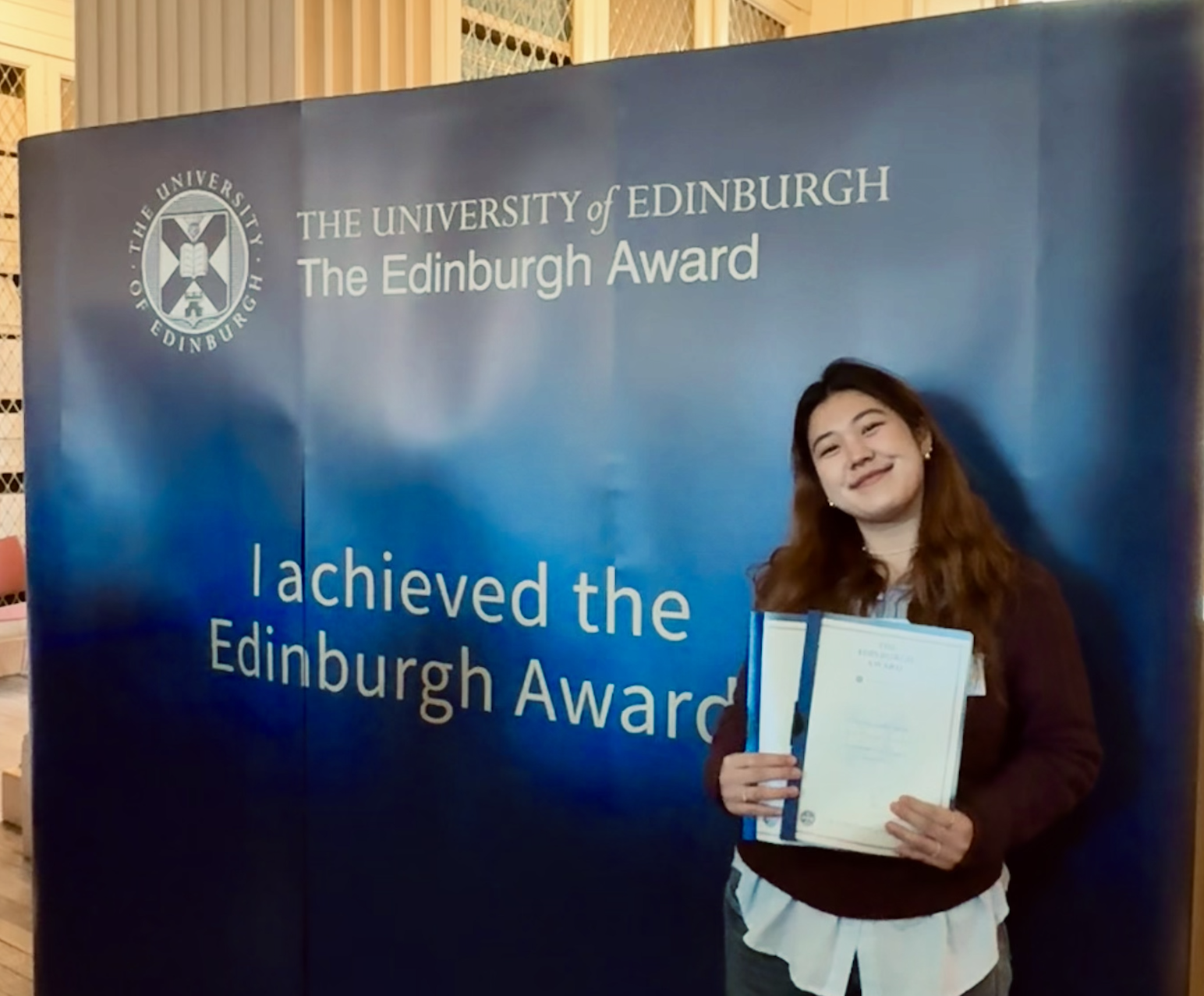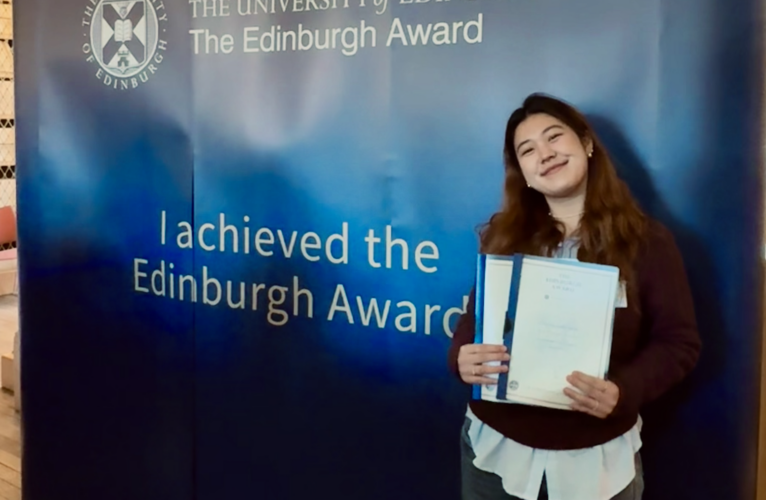Blog by Shirley
The Edinburgh Award is one of the most popular programs at our university, with over 30 versions for you to choose from. You might know friends who are currently working on it or have already finished it, or came across it during your first subject information seminar. This guide will help you decide if the Edinburgh Award is right for you. Plus, I’ll share some useful tips from my experience of completing three Edinburgh Awards in my first year.
What’s the Edinburgh Award?
In short, the Edinburgh Award is something you can choose to complete alongside your studies. It usually lasts one to two semesters depending on the award version you have decided to sign up for. The award itself allows you to gain formal recognition on your HEAR transcript by logging in the required hours of extracurricular activities you may engage in such as volunteering, internship or Peer Support, reflection inputs and attending coaching sessions or skills workshops offered by the host school.
Some pros of doing an Edinburgh Award:
Increased self-awareness and confidence in skills articulation
Whether you’re an incoming or current student at the university, we’ve all experienced the daunting task of identifying our strengths and weaknesses, and learning how to brand ourselves for part-time jobs or internships. Often, it’s simply because most of us have no idea where to start, and university curricula typically don’t include elective courses on understanding our professional strengths. In this case, completing the Edinburgh Award is probably a good place to start if you want to become more self-aware and gain more confidence in articulating your strong suits and areas for future improvement.
The reflection inputs you receive as part of the Edinburgh Award process, for example, ask you to rate yourself on skills categories such as communication, research and enquiry. You also get the opportunity to choose three skills that you want to develop throughout the award process, allowing you to keep a record of your personal skills development throughout the award. The award itself can guide you through a structured process of self reflection and goal setting, and also provide tangible evidence of your commitment to personal development.
Training yourself to be more accountable and proof of commitment
If you are someone like me, who may need a bit of external motivation to commit to personal development, the award can be an excellent way to showcase your commitment and accountability with your professional or personal development throughout your time at university. By setting personal development goals and actively working towards them through the award process, you are training yourself to be more accountable for the goals you set for yourself at the beginning. Moreover, completing the award entails regular self-assessment, adhering to deadlines and reflection inputs on your progress and future steps. By completing these steps, it can help you gain a sense of responsibility towards personal development, and also demonstrates a tangible commitment to your professional development. In other words, it shows that you are willing to invest time and effort into achieving your target goals, and can become a convincing case when you are presenting yourself for that part-time job or internship you want.
Enhanced CV and Transferable Skills for professional development
It’s obvious that one of the most tangible benefits you’ll receive after completing the award is the chance to boost your CV by showcasing your dedication to professional development and the skills you’ve acquired in the award. The structured activities and workshops in the award are designed to enhance skills that will be valued in any professional setting. For example, the skills I chose for my Edinburgh Award for Professional Development in the school of SPS include problem solving and communication in a variety of different settings, which I was able to highlight in my CV by articulating how I’ve showcased development of these skills in my relevant experiences such as remote policy internships. The award itself can train you to put the skills you wish to develop into practice through various impact activities, and provide concrete examples that you can highlight in future job applications and interviews.
 Some things to consider before choosing an Edinburgh Award:
Some things to consider before choosing an Edinburgh Award:
Check out the available award versions
As an example, at the School of Social and Political Science, there are currently three award versions up and running that you can sign up for. It’s important to consider which version suits your situation the best, i.e: making sure completing the award doesn’t feel like an extra burden that you are obligated to complete outside of your studies. Some awards may include eligibility criteria that’s up to you to check whether you’ve checked the box or not, e.g: award versions only open to students with internships or with a leadership role. During my first year, I chose to complete the professional development version of the Award at the School of Social and Political Science because I knew I wanted to first understand what professional development entailed and gain an insight in the skills that can become useful in my future career paths. You can check out the different Award versions at the social website for Edinburgh Award, including the kind of activities that you can use towards completing the award, such as leadership roles in societies or volunteering.
Edinburgh Award Activities and Versions
Time dedication
Before signing up for one of the awards, realistically consider how much time you are willing to dedicate to this award. Often enough, this can help you decide whether this is the right opportunity for you at this moment and ensure that you can make the most of the experience if you choose to pursue it. The award process involves attending workshops, participating in various activities and completing reflective exercises. Balancing these requirements with your academic responsibilities, such as going to lectures or writing an essay, and giving yourself some downtime to relax, is an important skill to master.
Consider Alternatives
If you decide that the Edinburgh Award is not the right fit for you at the moment, consider exploring other opportunities for gaining professional and personal development. For instance, the SPS Certificates offered by the School of Social and Political Science might be a suitable alternative. These certificates recognize your attendance at specific skills development workshops and require a shorter time commitment compared to the Edinburgh Awards. While they won’t appear on your Higher Education Achievement Record (HEAR) transcript, they still make a valuable addition to your CV. Participating in these workshops allows you to reflect on your skill development through surveys without the need to attend extensive input sessions or complete impact activities. This alternative can provide a more flexible way to enhance your skills and demonstrate your commitment to personal growth and professional development.

Tips on making the most of your Edinburgh Award Experience
Tip #1: Learn how to manage your time
One of the things that I wish I had understood before signing up for the Edinburgh Awards is that time management can be your best friend. When you are completing the award, you are also expected to be balancing your coursework, extracurricular activities and other commitments with the award requirements, so it’s crucial to develop a solid plan to avoid burning out! For example, using tools like planners or digital calendars to remind yourself of upcoming deadlines and workshops, and using the log book that the university offers for tracking hours to make sure you’re meeting the Award’s required hours. Allocating specific time blocks for the Award’s activities, such as volunteering or writing reflections, will help you avoid last-minute stress.
Tip #2: Utilize the resources you are given along the way
Make the most of the resources available to you! Take advantage of the workshops and events offered – they’re designed to enhance your skills and provide practice insights into certain job industries or professional skills. Engage in one-on-one coaching sessions and peer coaching opportunities to receive personalized feedback and guidance if you’re ever feeling lost. One thing I really enjoyed using during my first year was the professional development Toolkit offered by the Student Development Team at the School of Social and Political Science, where question prompts are given to you in a journal format, enabling you to capture your thoughts and reflections along your Award journey. Additionally, don’t hesitate to book appointments with advisors on the Edinburgh Award team – their expertise can offer tailored support to ensure you’re on track!
Tip #3: Consult and communicate with others
The Edinburgh Award is designed to be collaborative, so connect with peers who are working on the award with you and share your award experiences with each other. Finding peers or friends completing the award at the same time as you can provide valuable perspective and a great source of motivation. Talk to friends that may have completed the award in the past and get some practical tips from them if you’d like. If you are more comfortable talking rather than writing down your reflections, I recommend regularly communicating with your professional development coach and sharing your progress and challenges through one-to-one online sessions. It’s a great way to understand how you’re leveraging yourself for greater personal growth after completing the award!
I hope you found this lengthy guide helpful in deciding whether the Edinburgh Award is right for you. Whether you choose to embark on completing the award or explore other options for personal and professional growth, remember that every step you take contributes to your development. Stay tuned for more posts from me!
- You can find more information about the Edinburgh Award on The University of Edinburgh Careers Service website.
- The SPS Student Development Office offers a range of training to boost your skills and prepare you for the world of work. You can find more information, including details on the Edinburgh Award, on the SPS website.



